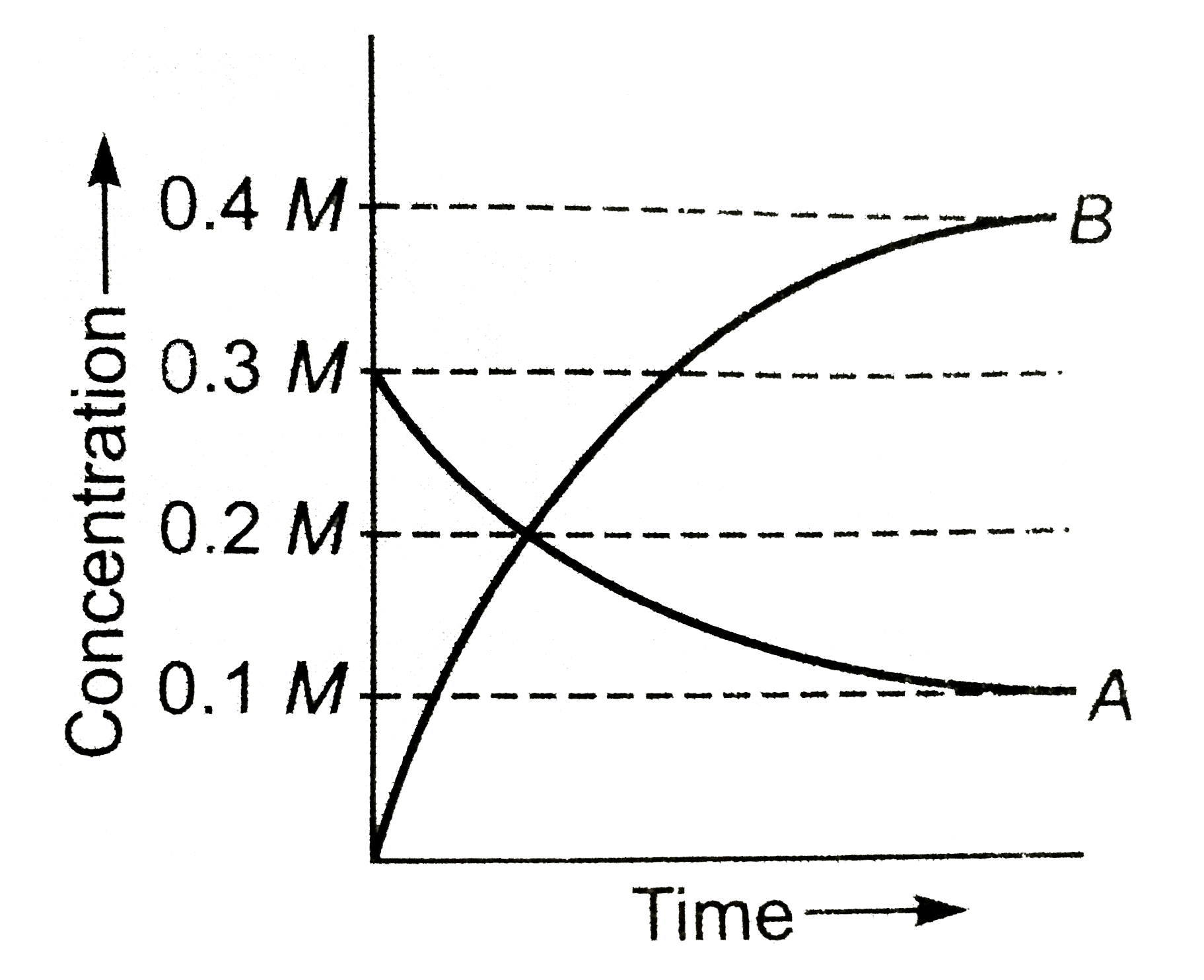The reaction,
2A(g)+B(g)⇔3C(g)+D(g)
is begun with the concentration of A and B both at an intial value of 1.00 M. When equilibrium is reached, the concentration of D is measured and found to be 0.25 M. The value for the equilibrium constant for this reaction is given by the expression:
[(0.75)3(0.25)]÷[(0.50)2(0.75)]
[(0.75)3(0.25)]÷[(0.50)2(0.25)]
[(0.75)3(0.25)]÷[(0.75)2(0.25)]
[(0.75)3(0.25)]÷[(1.00)2(1.00)]
The correct Answer is:A
Step by step video, text & image solution for The reaction, 2A(g) + B(g)hArr3C(g) + D(g) is begun with the concentration of A and B both at an intial value of 1.00 M. When equilibrium is reached, the concentration of D is measured and found to be 0.25 M. The value for the equilibrium constant for this reaction is given by the expression: by Chemistry experts to help you in doubts & scoring excellent marks in Class 12 exams.
Updated on:21/07/2023Topper's Solved these Questions
- NEETBook:NEET PREVIOUS YEAR (YEARWISE + CHAPTERWISE)Chapter:NEETExercise:QUESTION
Explore 92 Videos
- NEETBook:NEET PREVIOUS YEAR (YEARWISE + CHAPTERWISE)Chapter:NEETExercise:MCQ
Explore 94 Videos
- NEETBook:NEET PREVIOUS YEAR (YEARWISE + CHAPTERWISE)Chapter:NEETExercise:MCQ
Explore 94 Videos
- METALLURGICAL OPERATIONS Book:NEET PREVIOUS YEAR (YEARWISE + CHAPTERWISE)Chapter:METALLURGICAL OPERATIONS Exercise:MCQ
Explore 21 Videos
- NEET 2018Book:NEET PREVIOUS YEAR (YEARWISE + CHAPTERWISE)Chapter:NEET 2018Exercise:QUESTION
Explore 45 Videos
Similar Questions
For the reaction A+B⇔C+D, the initial concentrations of A and B are equal. The equilibrium concentration of C is two times the equilibrium concentration of A. The value of equilibrium constant is ………..
View SolutionA reaction, A(g)+2B(g)⇔2C(g)+D(g) was studied using an initial concentraction of A and B were found to be equal. The value of KP for the equilibrium is
View Solution
Knowledge Check
The reaction,
2A(g)+B(g)⇔3C(g)+D(g)
is begun with the concentration of A and B both at an intial value of 1.00 M. When equilibrium is reached, the concentration of D is measured and found to be 0.25 M. The value for the equilibrium constant for this reaction is given by the expression:A[(0.75)3(0.25)]÷[(1.00)2(1.00)]B[(0.75)3(0.25)]÷[(0.50)2(0.75)]C[(0.75)3(0.25)]÷[(0.50)2(0.25)]D[(0.75)3(0.25)]÷[(0.75)2(0.25)]The reaction, 2Ag+Bg⇔3Cg+Dg is begun with the concentrations of A and B both at an initial value of 1.00 M. When equilibrium is reached, the concentration of D is measured and found to be 0.25 M. The value for the equilibrium constant for this reaction is given by the expression
A[(0.75)3(0.25)]+[(1.00)2(1.00)]B[(0.75)3(0.25)]+[(0.50)2(0.75)]C[(0.75)3(0.25)]+[(0.50)2(0.25)]D[(0.75)3(0.25)]+[(0.75)2(0.25)]The reaction,
2A(g)+B(g)⇔3C(g)+D(g)
is begun with the concentration of A and B both at an intial value of 1.00 M. When equilibrium is reached, the concentration of D is measured and found to be 0.25 M. The value for the equilibrium constant for this reaction is given by the expression:A[(0⋅75)3(0⋅25)]÷[(1.00)2(1.00)]B[(0⋅75)3(0⋅25)]÷[(0⋅50)2(0⋅75)]C[(0⋅75)3(0⋅25)]÷[(0⋅50)2(0⋅75)]D[(0⋅75)3(0⋅25)]÷[(0⋅75)2(0⋅25)]
A reaction, A(g)+2B(g)⇔2C(g)+D(g) was studied using an initial concentraction of B which was 1.5 times that of A. But the equilibrium concentrations of A and B were found to be equal. The vlue of Kp for the equilibrium is
View SolutionFor the reaction, A(g)+2B(g)⇔2C(g) one mole of A and 1.5 mol of B are taken in a 2.0 L vessel. At equilibrium, the concentration of C was found to be 0.35 M. The equilibrium constant (Kc) of the reaction would be
View SolutionIn a chemical reaction , A+2BK⇐⇒2c+D, the initial concentration of B was 1.5 times of the concentrations of A , but the equilibrium concentrations of A and B were found to be equal . The equilibrium constant (K) for the aforesaid chemical reaction is :
View SolutionFor a reaction A(g)+B(g)⇔C(g)+D(g) the intial concentration of A and B are equals but the equilibrium constant of C is twice that of equilibrium concentration of A. Then K is
View SolutionThe figure shows the change in concentration of species A and B as a function of time.
The equilibrium constant Kcfor the reactionA(g)⇔2B(g) is :

View Solution

